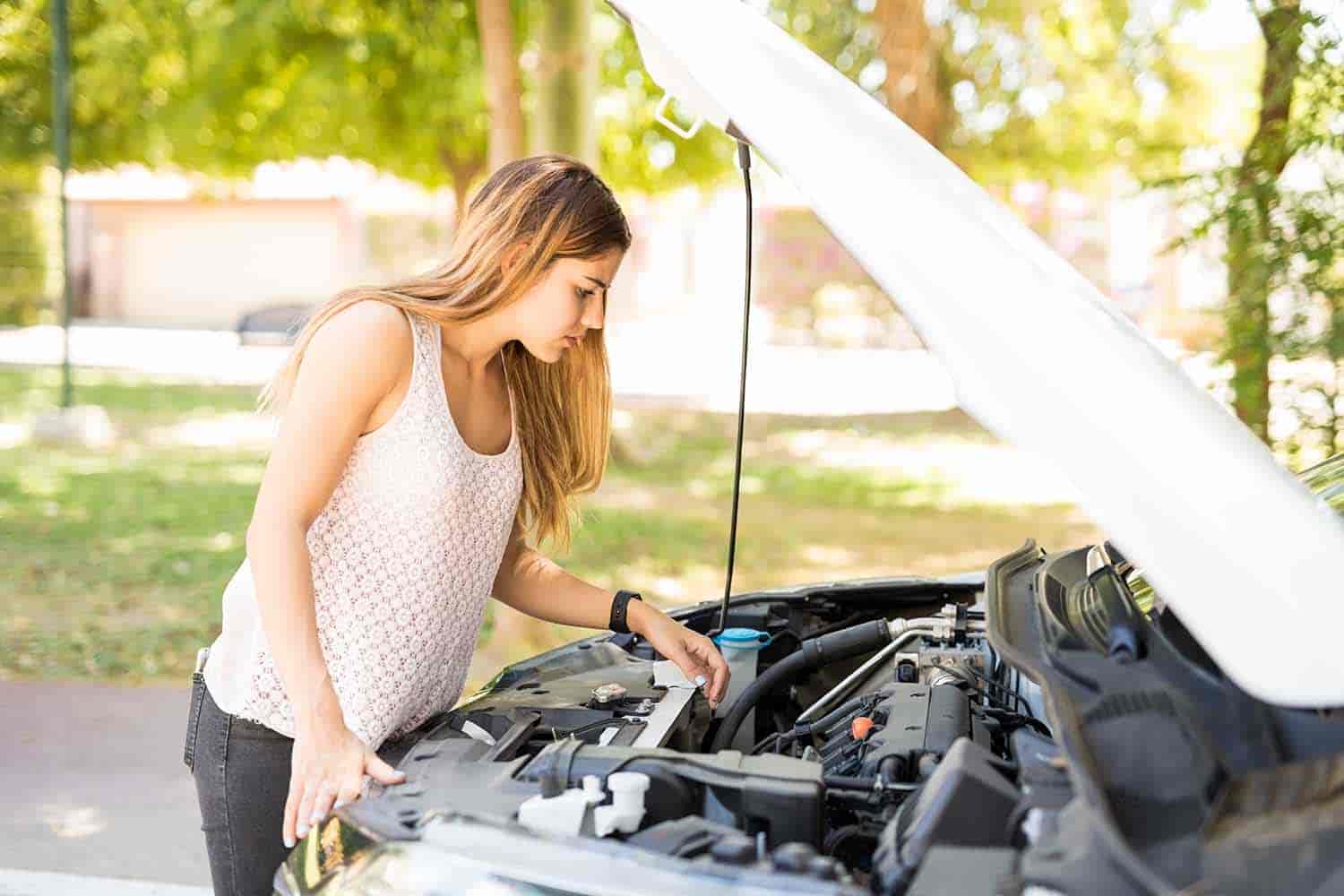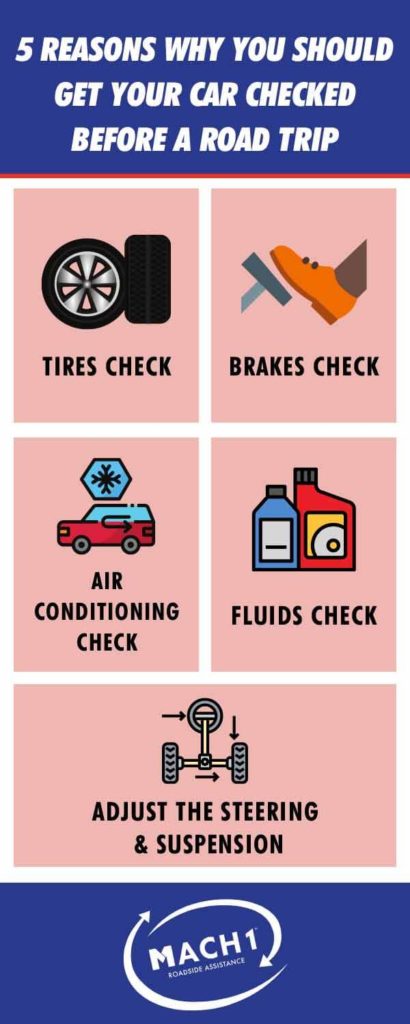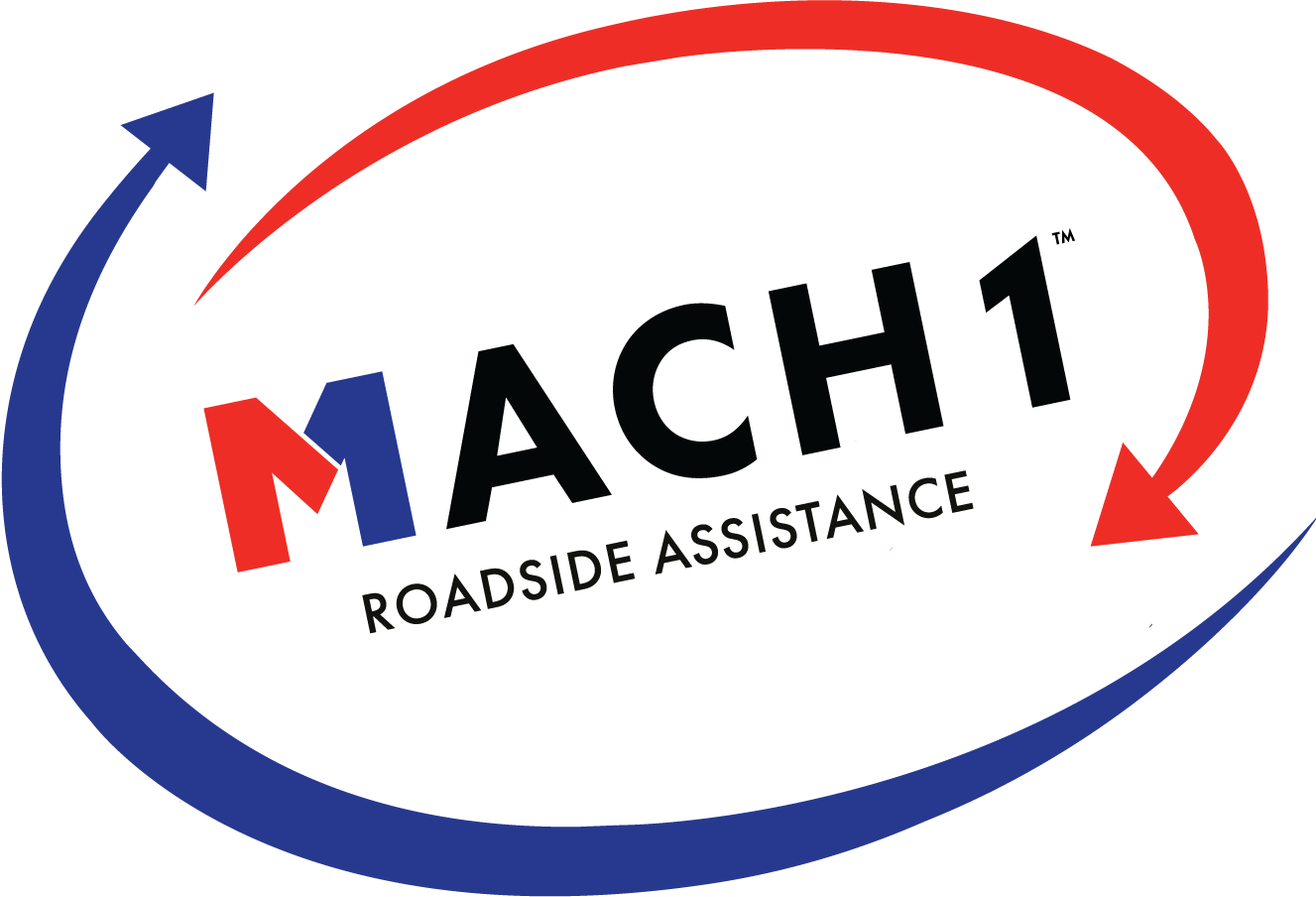
21 Sep 5 Reasons Why You Should Get Your Car Checked Before a Road Trip
If you are like most people, you likely drive your car only for short periods of time on a daily basis and for relatively short commutes. This kind of driving does not require regular maintenance and check ups with the mechanic. However, if you are planning a road trip, you should inspect your car.
While checking your car for maintenance should be a regular habit, there are five reasons why you should especially do this before a road trip. Checking your tires, brakes, air conditioning system, fluids, and the steering and suspension system will ensure that your ride is both safe and enjoyable.
If you have any questions regarding how to make your car ready for the long road trip ahead or whether your car should rest during the trip, make sure you read through. This article will provide all the information you need to prepare yourself and your vehicle, in addition to other recommendations to make your trip more enjoyable.
Ever Wonder, Is My Car Okay for a Road Trip?
Most people who use their cars for relatively short daily commutes do not worry extensively about maintenance issues. They do the essential checks as required and drive their vehicles until some issues or complications arise. However, if you are planning for a road trip, you may wonder if your car can handle the long drive.
Most cars that are in good running condition and do not require frequent extensive repairs should be able to handle a long drive. Of course, newer vehicles will have lower mileage and lower maintenance issues, making them more appropriate for the road trip. Older vehicles with high mileage will be more likely to experience issues.
If you have already taken a road trip with your car before, you know what to expect and the potential problems that might arise. If you have a newer car that has low mileage, you likely have not yet driven it on long trips. The advantage, however, is that newer cars will almost certainly be ready for the trip and will not require significant inspection.
The owners of older vehicles should be more cautious about long road trips. This is especially the case if the vehicle has not been properly maintained. Of course, older vehicles with proper maintenance and regular inspections should be able to handle long trips on the road and the likelihood of any technical problems should be pretty low.
Should You Get Your Car Checked Before a Road Trip?
Regardless of how new your vehicle is, you should still get it checked before a road trip. Your mechanic should inspect your vehicle for regular maintenance and for any problems that may arise during the trip.
One of the things that can most complicate your trip is being stranded on the road with car problems. While you may think that your car is in order and that there are no problems, only your mechanic can tell you this with certainty. That is why you should have your car inspected two-three weeks before your road trip.
Inspecting your car several weeks before the road trip will give your mechanic enough time to fix any problems. If your trip is especially long, or you are traveling from coast to coast, it is especially important to give your mechanic enough time. Last thing you need is last-minute complications before the trip that you do not have enough time to fix.
5 Reasons Why You Should Get Your Car Checked Before a Road Trip
While you most likely take your car to your mechanic for regular maintenance, you should still get it inspected before a road trip. Your mechanic will identify any problems and help get your car repaired and ready for the trip.

There are five reasons why you should have your car checked before a road trip:
- Tires Check
- Brakes Check
- Air Conditioning Check
- Fluids Check
- Adjust the Steering and Suspension
Making sure that these five items are in order will give you a peace of mind before you set out on the road trip. While you may think that there are no issues with your vehicle, the only way to know with certainty is to get professional advice and confirmation.
Tires Check
With tires, you need to make sure that there is no damage or puncture that could cause them to lose air. A tire blowout is one of the most common problems that can arise during a trip.
In addition, if you have worn tires, this can make it more difficult to stop your car. This is especially true in rain or snow. Take your car to a mechanic to ensure that your tires are in good condition.
Brakes Check
Worn brake pads can also make your trip significantly more dangerous because it will make it more difficult to stop your car. It is recommended to replace your brake pads at anywhere between 25,000 and 70,000 miles.
If you have encountered any issues with braking, you should make sure to notify your mechanic. Your mechanic will tell you if your brake pads need to be replaced after inspecting them.
Air Conditioning Check
Unlike brakes check or tires check, a malfunctioning air conditioning unit will not necessarily make your trip more dangerous. However, it will certainly make it more miserable, especially if you are traveling during summer months.
If the air in your A/C unit is not blowing as strong as it should, you should take your car to a mechanic for inspection. You may have clogged air filters or a bad fuse that is causing the unit to malfunction.
Fluids Check
One of the most common regular car maintenance items is oil change. All drivers understand the importance of regular oil changes. However, there are other fluids you should check before you set out on a road trip.
For example, you should ensure you have a proper level of many fluids before you set out to drive. These include:
- Power steering fluid
- Brake fluid
- Transmission fluid
- Windshield washer fluid
These essential fluids to a large extent determine the safety of your vehicle. Make sure your mechanic inspects all of them and any others that they may consider important. These fluid levels should be checked regularly, but should always be checked before a road trip to avoid problems while on the road.
Adjust the Steering and Suspension
Your car’s steering and suspension system is one of the most important elements that will determine whether your ride is smooth as you reach your destination. If you have any loose steering parts or damaged shocks or struts, this could cause problems on your trip.
Before you head out for the road trip, make sure your mechanic inspects the steering and suspension system thoroughly. This is not only for your safety, but also for the comfort of the ride.
How Long Should I Drive My Car on a Road Trip?
The amount of time you should drive on a road trip will to a large extent depend on a number of factors. For example, if you have experience driving, and especially if you are a professional driver, you will be able to make a longer distance before taking a break. In addition, you will be better prepared if you have previous road trip experience.
- Less experienced drivers, and especially those with no previous road trip experience, should make more regular breaks
- As a general rule, you should try to drive less than eight hours a day, while making short breaks every two hours
- More experienced drivers can drive up to 10-12 hours a day, with breaks every three hours
This, of course, is the case if you are driving alone. If there are other passengers who have a valid driver’s license, you can take turns driving and make a longer distance in a shorter amount of time. If there are kids or elderly people, you will likely take longer and more frequent breaks because these passengers might need more time for toilet breaks or health reasons.
Finally, this will also depend on the weather and road quality. If you are driving in nice weather and on highways, you can drive longer distances. However, if it is raining or snowing or the road quality is poor, you will drive slower and it will be more difficult to concentrate. This will increase the amount of time it takes to reach your destination.
How Often Should You Let Your Car Rest on a Road Trip?
If your vehicle is thoroughly checked and inspected before a road trip, it likely does not require rest during a road trip. Assuming that the vehicle has sufficient fuel, water, engine oil and other necessary liquids, it does not need to rest from a mechanical perspective. You should visit a mechanic prior to the trip to make sure these are in order.
Indeed, shorter trips with frequent acceleration and braking are more detrimental to your vehicle compared to long road trips where you may spend hours on the highway. Prior to the trip, you should make sure that all the essential fluids are properly serviced and check your tires for pressure.
From a mechanical perspective, your car can drive continuously and does not need to stop for breaks. Of course, you will inevitably need to take a break at some point to refuel or recharge in case of electric vehicles. Notwithstanding this, there is nothing wrong with driving continuously for hours, provided your vehicle is in good condition.
One thing that you should always keep in mind is the temperature gauge for signs of engine overheating. If you see signs of overheating, this is one circumstance where you should immediately try to stop and give your vehicle some rest. Your engine may overheat if you are driving continuously in hot temperatures, requiring a break.
Conclusion
In addition to the five maintenance requirements, you should also make sure that your vehicle is stocked with essentials. These include, for example, spare tire, spare tire tool kit, jumper cables, emergency blankets, first aid kit, etc. If there are other people traveling with you who need prescription drugs, make sure to bring those as well.
Going on a road trip, either alone or with friends and family, is a great way to spend some quality time on the road and visit new locations. If you have the time, make sure to take detours and visit places on the way to your destination. Moreover, this is a great opportunity to try some new foods or drinks that are specific to the destination you are traveling to.
